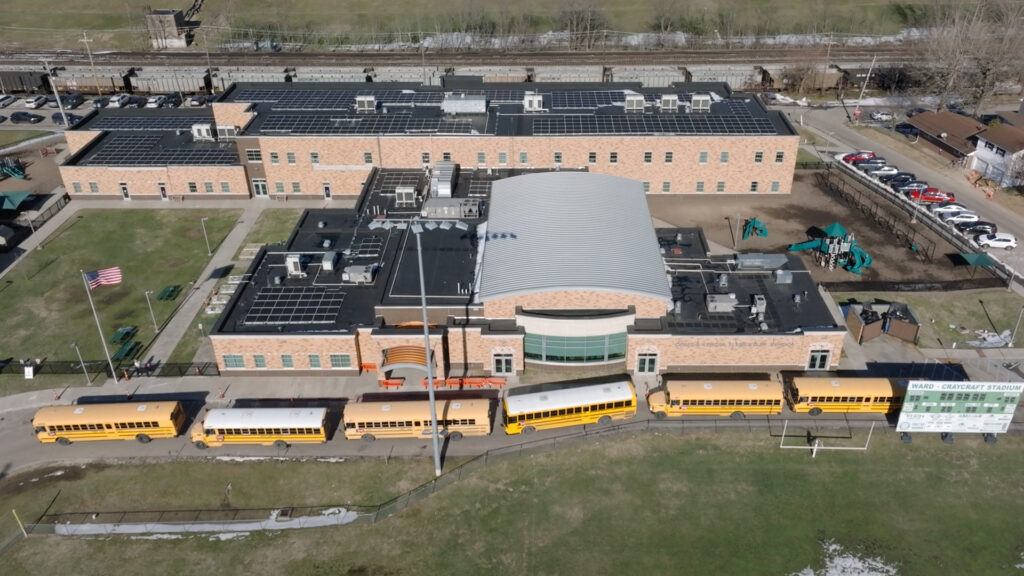President Donald Trump’s budget bill will wind down tax credits for commercial and residential solar projects amid a nationwide boom in solar installations.
Curtis Tate spoke with Dan Conant, founder and CEO of Solar Holler, about the bill’s impact on the company.
This interview has been edited for length and clarity.
Tate: Where does the budget bill leave you?
Conant: I will say the Senate version of the bill left us in a much better place than the House version did.
Tate: In what way?
Conant: There’s more of an off-ramp, particularly around commercial projects. So the way the House bill had been written, there was a 60-day window to start construction on projects, including projects that had been in the works for years. In the Senate version of the bill, by contrast, as long as we build the project and start generating electricity by the end of 2027, all the tax credits remain, so we’ve really got a two-and-a-half year off ramp for church projects and school projects and stuff like that. There’s also the ability to start construction by July of next year.
Tate: Aren’t there some new restrictions?
Conant: There was an executive order that went out. The executive order was to have the U.S. Treasury release new guidelines within 45 days of the order. We’re looking forward to seeing what’s there.
Tate: Are you going to have to lay anyone off?
Conant: No. Not right now.
Tate: Is your job training pipeline intact?
Conant: Within Wayne County Schools, we’ve gone through three cohorts over there, and this most recent cohort we had, I’d have to double check the number. I forget if it’s 10 or 15 interns who are high school seniors, and really at that important fork in the road of life where you can either take off for not-West Virginia, or stay home. And so it’s been really exciting to have an internship program for them. So through that program, students are going to school four days a week, and they’re on the vo-tech track. And then one day a week, they’re paid members of our teams, learning on the job. So far, we’ve had 40% of those people sticking around and after graduation and becoming full-time members of the Solar Holler team.
Tate: Are you working with other school districts to install solar?
Conant: That’s the only one that is contracted at this point. We’re talking with a bunch of others. And we’re also working with some municipalities for similar projects. For instance, the city of Kenova, their municipal buildings, and the city of Montgomery. Those are all contracted at this point.
Tate: Anyone who wants solar is going to have to move quickly, right?
Conant: Yeah, that’s absolutely true. And so for homeowners who want to get in before the credits go away, the projects actually need to be built by the end of the year. So you know, we’re probably looking at the next month or so before we’re fully booked out for the year, just depending on how quickly people are signing.
Tate: Are you having any supply chain issues?
Conant: We’ve already locked up our panels through the end of the year, so we’re good on that.
Tate: Where do you think the Public Service Commission (PSC) will come down on net metering?
Conant: We’re expecting a ruling from the Public Service Commission by late August. So another month or so, and honestly, we’re feeling really good coming out of the hearing. Lots of folks showed up to that, and the testimony that was submitted and discussed was all really good. At this point, we’re just in a waiting game to see what the commission comes out with. But I think the points we were making in our testimony were that just like with the budget bill. You need off-ramp times and time to actually build the projects that have already been committed to. And I think I’m confident that the commission heard that, and I think we’re probably going to end up in a similar place as what we landed at with First Energy in the case last year.
Tate: You’re pretty positive about this overall. Anything that gives you concern?
Conant: The part I’m bummed about, or just sad about, is America as a whole had shot up the rankings for solar manufacturing so that we’re now third in the world. Since the Inflation Reduction Act passed, we’ve had more than 300 factories announced around the country, and we’re going to see a real softening of demand, and there’s going to be a race to push prices down, which will ultimately make it harder for American manufacturers to compete. So I’m nervous about that going forward, and just how well all these new factories will be able to do. Even though we’re not in the manufacturing business, one of my big dreams is that we’d be able to see every part of the supply chain reshored.
Solar Holler is an underwriter of West Virginia Public Broadcasting.























